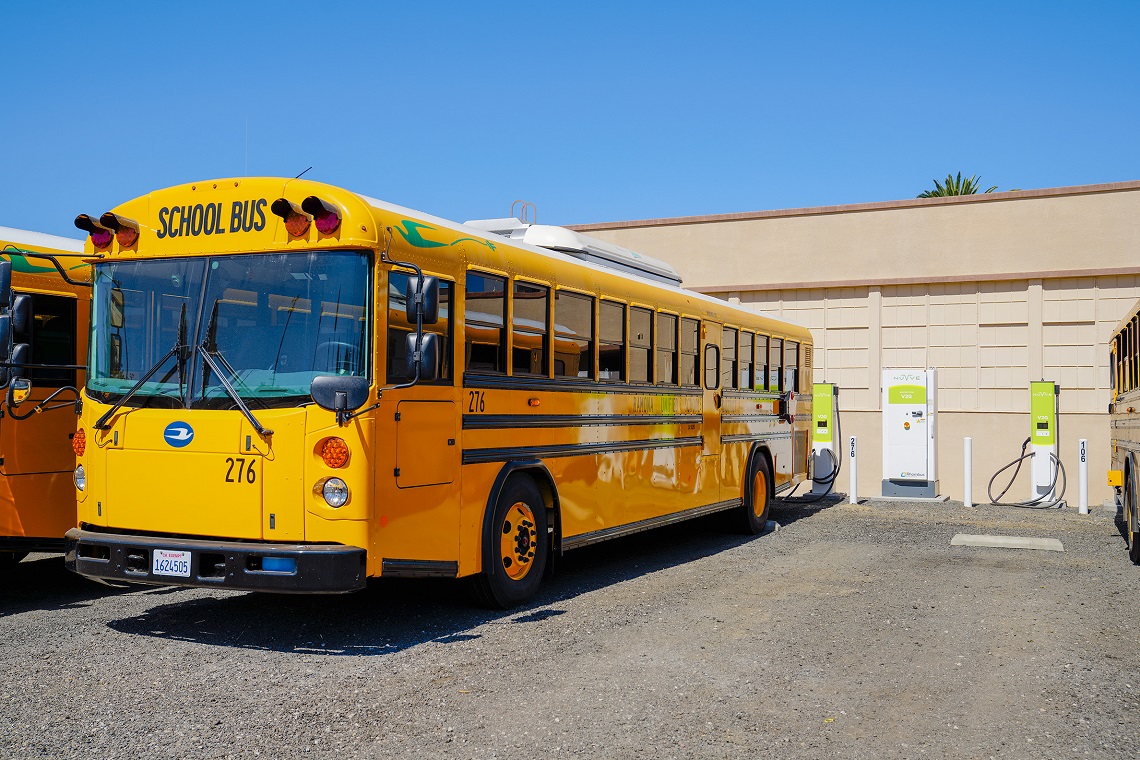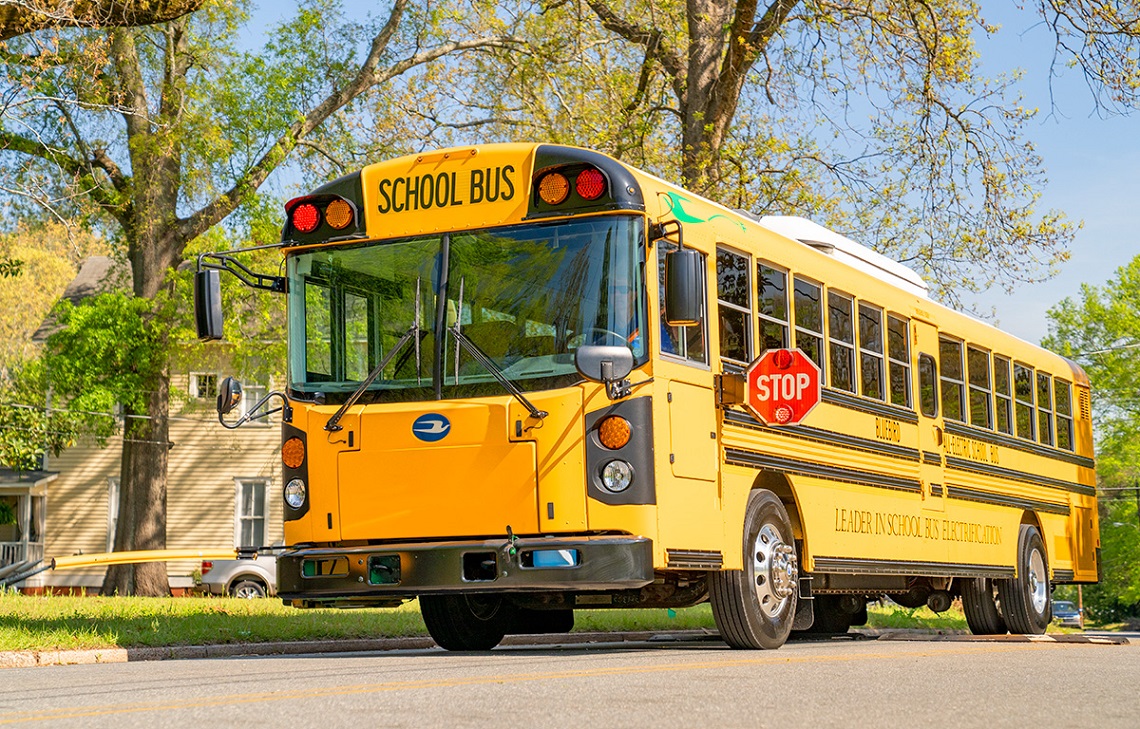Big Green School Bus
Maggie Polachek leads the drive toward zero-emission transportation for America’s K-12 students
Hop in an Uber these days, and you’ll likely find yourself in a quiet, fuel-efficient hybrid vehicle. But millions of children are still riding to school in buses belching diesel fumes, a fuel more closely associated with a prior generation of tractor-trailer trucks.
Maggie Polachek (MBA 2020) is working to change that. She serves as a special advisor for implementation at the Environmental Protection Agency (EPA), where she facilitates a $5 billion program that’s transitioning the nation’s school bus fleet to zero and low-emission vehicles.
“Diesel school buses are harmful to the health of our kids and communities,” says Polachek. “The beauty of this program is that it will have a positive impact on children’s health and will simultaneously help meet crucial climate goals.”
Rolling out clean buses
Polachek is based in Washington, DC, where she works on the implementation of the Biden Administration’s signature legislation ranging from the Bipartisan Infrastructure Law and the Inflation Reduction Act to the American Rescue Plan. One of her primary responsibilities is to ensure the successful implementation of the EPA’s Clean School Bus Program, a new initiative funded by the Bipartisan Infrastructure Law. That means everything from highlighting the program to meeting with school bus manufacturers and utility providers to offering assistance to eligible school districts nationwide.

The EPA recently conducted the first of several funding opportunities for the Clean School Bus Program. School districts were able to apply for significant funding to purchase new low- and zero-emission buses to replace those running on diesel. The EPA will announce the winners in mid-October and will give priority to high-need school districts, including low-income, tribal and rural schools.
“We kicked off this initial funding opportunity with $500 million for schools,” she says. “It was important to make sure that school bus fleet managers, superintendents and other stakeholders in communities around the country were aware of the funding and knew how to apply.”
Polachek reports that the reception has been overwhelmingly positive: “School districts across the country are excited about electric school buses and manufacturers are ramping up to meet the increased demand. We hope to see electric school buses funded by this program picking up kids at school starting in the fall of 2023.”
American rescue
Polachek’s role at the EPA is a natural evolution from her previous position as chief of staff for the White House American Rescue Plan implementation team. Both are high-level project management roles requiring communication skills, resource allocation and project oversight.
At the White House, she managed a ten-person team that worked with dozens of federal agencies to oversee the implementation of the $1.9 trillion COVID-19 relief package.
“I made sure that all trains ran on time and played a large role in crafting communications strategies and establishing partnerships between the public, private and nonprofit sectors to expand the impact of American Rescue Plan programs around the country,” says Polachek.
While the most visible elements of President Biden’s American Rescue Plan are the initial $1,400 direct stimulus payments and the child tax credit, the plan includes a wide range of programs from housing initiatives to funding for K-12 and higher education to lower health care costs for millions of Americans. Raising awareness and clearly communicating the value of these programs to the American people are key goals.
Dream internship launches career
Polachek’s career has alternated between Washington, DC, and Washington state. After earning her undergraduate degree in political science at Wellesley College, she landed a dream job: a summer internship at the White House Domestic Policy Council during the Obama Administration. “It sparked my interest in policy and politics and launched my professional journey,” she says.
If there’s one thing I’ve learned in my experience so far, it’s that government, the private sector, philanthropy and nonprofits all have important roles to play in moving the world forward.
Polachek’s early career also included working in the United States Senate, on a gubernatorial election campaign, and several years at the Center for American Progress—a leading DC think tank. In 2018, she decided to advance her career with an MBA.
“The management and leadership skills that you learn in business school are useful in all types of organizations,” she says. “I wanted to develop metrics-driven approaches and learn how to effectively manage people, projects and programs. I have a better framework for management because of Foster.”
Collaborative, customized MBA
Geography played a role in Polachek’s choice of the Foster School, but it was its collaborative spirit that won her over. “My brother went to UW as an undergrad, so I was already familiar with the school,” she says. “And Seattle is beautiful—I wanted to live there. When my now husband and I visited for Welcome Weekend, we immediately felt a warm sense of community.”
Polachek made the most of her time in the Foster MBA Program. Among the highlights was her role as a Fritzky Leadership Fellow. “That was one of my best experiences,” she recalls. “It was a class with hands-on coaching experience. That skill-building at Foster has come in handy in my current work where I regularly coach others.”
She also co-founded Foster’s Business and Policy Group, a student club focused on the intersections between the public and private sectors.
The conclusion of Polachek’s time at Foster coincided with the pandemic, which presented another unique opportunity. Through Foster’s relationship with Gates Ventures, she researched Vietnam’s successful early approach to managing the spread of COVID-19.
“The Foster MBA Career Management team knew that public policy was an interest of mine and approached me to work on this project,” she says. “I conducted a deep dive into Vietnam’s early response to COVID-19, where I interviewed medical experts and policy makers on the ground to draw initial conclusions about Vietnam’s COVID-19 strategy.”

Moving the world forward
After graduation, Polachek took a role in government affairs and global public policy at Starbucks, which she says she “absolutely loved. It was rewarding to work on policy inside a Fortune 500 company with such massive scale and impact.”
But she couldn’t turn down the opportunity when a former boss recruited her for a job back at the White House.
“If there’s one thing I’ve learned in my experience so far, it’s that government, the private sector, philanthropy and nonprofits all have important roles to play in moving the world forward,” she says. “I am grateful to be a part of that work.”
Electric bus photographs courtesy of Blue Bird Corporation.
